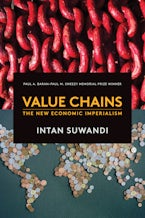Award-winning book showcases case studies uncovering the exploitation of labor and class in the Global South
Winner of the 2018 Paul M. Sweezy—Paul A. Baran Memorial Award for original work regarding the political economy of imperialism, Value Chains examines the exploitation of labor in the Global South. Focusing on the issue of labor within global value chains, this book offers a deft empirical analysis of unit labor costs that is closely related to Marx’s own theory of exploitation.
Value Chains uncovers the concrete processes through which multinational corporations, located primarily in the Global North, capture value from the Global South. We are brought face to face with various state-of-the-art corporate strategies that enforce “economical” and “flexible” production, including labor management methods, aimed to reassert the imperial dominance of the North, while continuing the dependency of the Global South and polarizing the global economy. Case studies of Indonesian suppliers exemplify the growing burden borne by the workers of the Global South, whose labor creates the surplus value that enriches the capitalists of the North, as well as the secondary capitals of the South. Today, those who control the value chains and siphon off the profits are primarily financial interests with vast economic and political power—the power that must be broken if the global working class is to liberate itself. Suwandi’s book depicts in concrete detail the relations of unequal exchange that structure today’s world economy. This study, up-to-date and richly documented, puts labor and class back at the center of our understanding of the world capitalist system.

